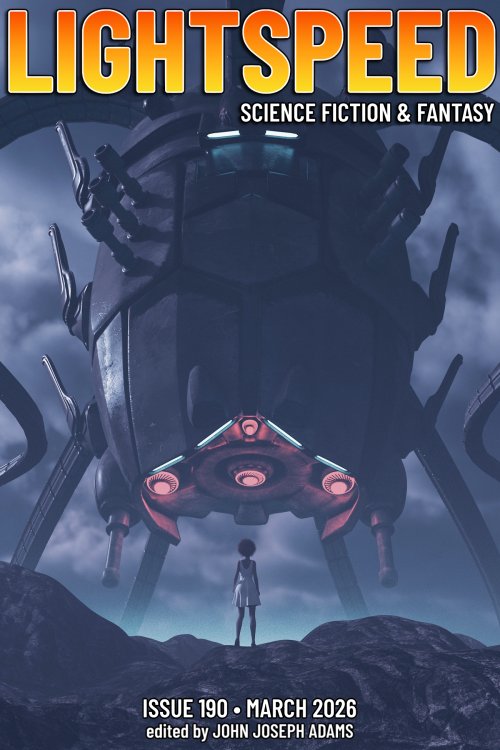What was the first seed for this story?
I studied medieval religion (primarily Christianity) in college, and after four years of thinking about embodied devotion and mortification of the flesh for the sake of divinity and the often tormented relationship between the worshiper and the worshiped, it hit me—this could be a science fiction plot. I think a lot of medieval ideas can actually be mapped well onto SF because both stand out so vividly against contemporary notions of identity, the body, the other, the divine, etc. And yet, of course, one influenced modernity, and the other is influenced by modernity, so I ended up in this triangulated setting where past, present, and possible notions all collided to make a world that (I hope!) feels both archaic and futuristic. The story was pretty spontaneous arising from that premise; I wrote it in about a week after coming home from graduation, and then Lightspeed was lovely enough to pick it up!
I must admit that it was a challenge to come up with questions for this story simply because so much of the work is happening on the sentence level. The metaphors and imagery are beautiful. To that I wanted to ask how you have built such masterful wrists to write something like this? What is your writing process like? What kind of literary lineage or background do you associate yourself to?
Thank you so much! I’m a very prose-obsessed storyteller, which is why flash and the shorter end of short stories come more naturally: I enjoy the constraint of building a plot where every word choice and signal to emotion is inextricable from the plot. In terms of process, though, every story is pretty different. Some pieces need months to germinate, while others I can patter out in a day or two. They usually always start with a strong opening scene, image, or line, and then it’s up to time and fate as to whether the rest of it wants to follow quickly.
Literary lineages are hard to pick out, and also hard to claim, though I do love the question. I grew up on the “girlhood-coming-of-age” classics, a taste I immediately transferred over to SFF when I started reading it as a teen, so Robin McKinley is definitely an authorial ancestress. I still hear echoes of her style in some of my stories. Otherwise, Diana Wynne Jones and, more recently, writers like Shelley Parker-Chan, Emily Tesh, and Seth Dickinson—all masters of silken story-telling, conflicted protagonists, and richly-textured worlds—are those I look up to and hope to emulate.
What were some of the challenges or apprehensions of using the second person? Or alternatively, what were some of the relief and joy?
Initially, I tried to tell this story in first person past-tense, and it didn’t work at all—it lacked the sense of instability that I wanted, so I switched to present-tense. But there’s something too immediate about present-tense with first person (I tend to avoid that combination), so I tried out second person, and it was perfect. I like how second person, unlike first or third, naturally establishes a dialogue between speaker and reader (the reader is addressed) while also overtly implicating the reader in the narrative (the reader is complicit). There are many presences and suggestions that arise in second person that intrigue me.
Correct me if I am wrong but some of the verbs especially given we had a surgeon in the picture allude to a kind of violence. What was it like putting this discussion of god/faith/religion in close proximity to cracked/shattered/drowned?
That definitely filtered in as well from the story’s medieval origins. Back then, communing with the divine was couched in images or metaphors of violence: you have these accounts of wounds, being pierced or attacked. But such is the nature of divine violence that it’s transformative, illuminating. In the context of this story, though, it’s also shoved up against a more earthly, clinical violence. The question is, where is the line drawn between these two violences enacted upon the character? It’s not clear in the opening scene, and it’s not within the scope of the story to answer that, but I hope the reader holds onto this question, especially going into the final lines.
Is there a project you are working on currently? And if not are there any themes, objects, or news that might be tickling your fingers?
I finally have the glimmerings of a novel idea after being scared off from long-form during the past two years by a particularly bad manuscript breakup (right story, wrong time). Like most things I write, it will likely be about constructions of the self, told by unreliable narrators, and involve a mirror. I’m also working on a few more short pieces for a collection I vowed to put together by the end of the year—only three more to go! If you liked this story and want to keep up with my other words, all my stories are linked at my website cblakeroe.wordpress.com.
Enjoyed this article? Consider supporting us via one of the following methods:










